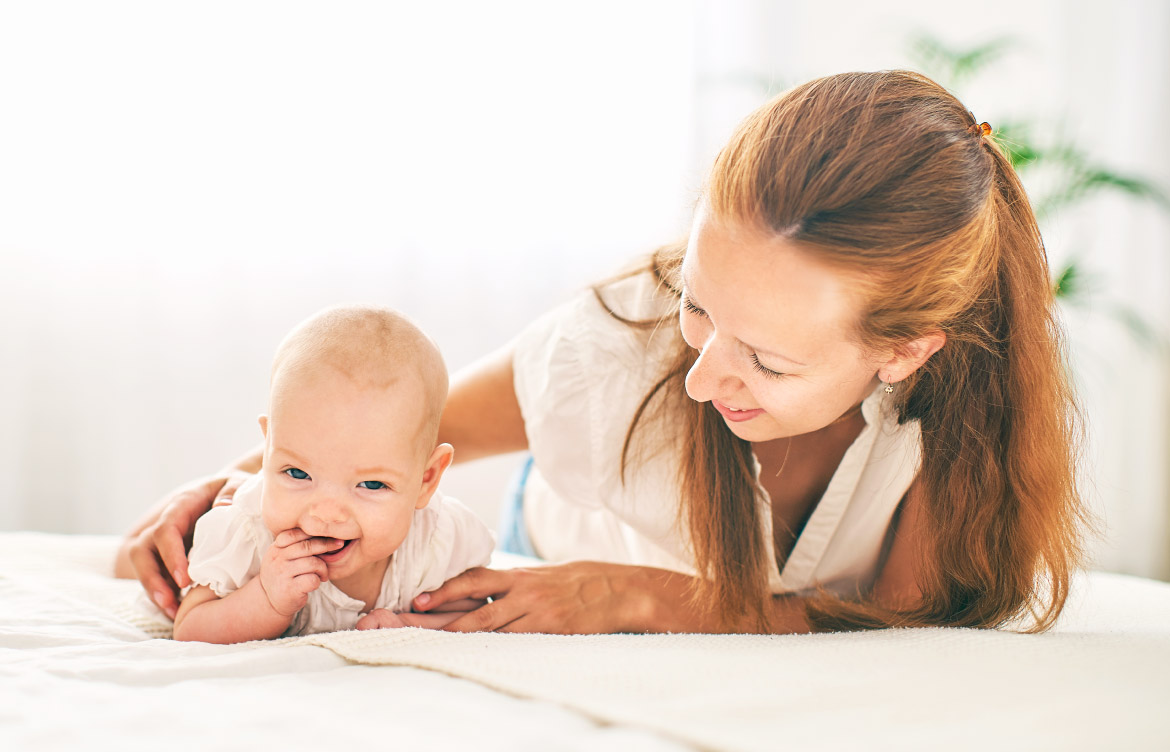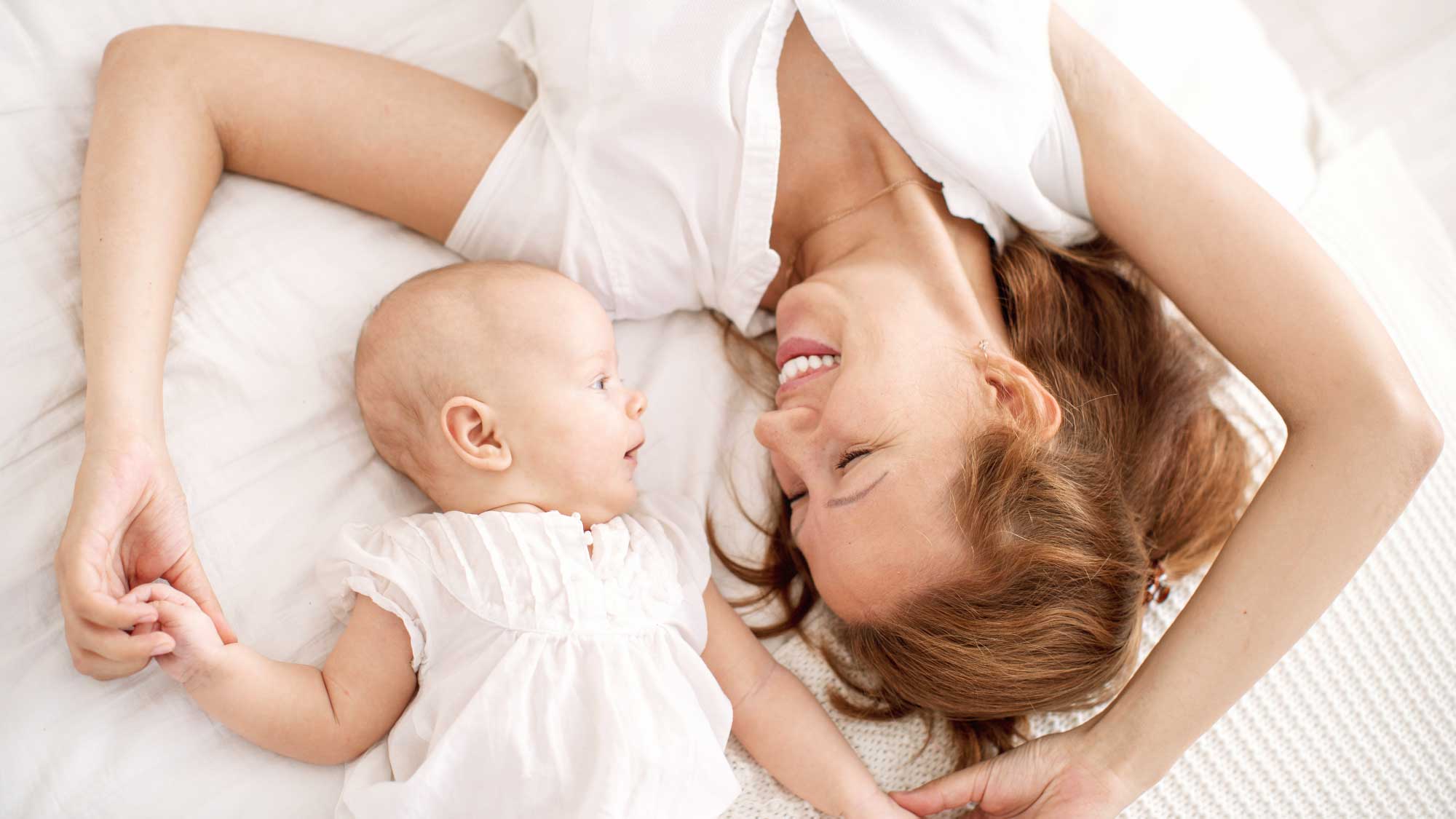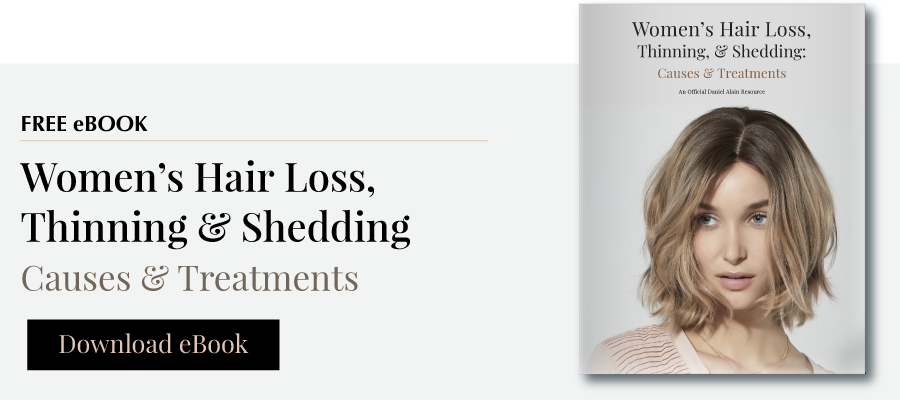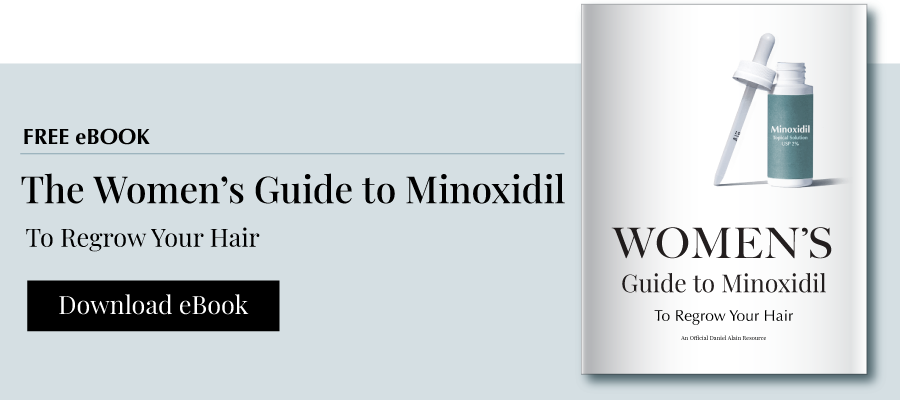Best Vitamins for Postpartum Hair Loss

Congratulations, new mom! Bringing home a baby is full of beautiful firsts and precious moments that stay with you for a lifetime. Watching your hair fall out in clumps does not fall into that category.
Thinning and shedding post-pregnancy happens to most of us, but that doesn't mean you have to accept it as part of the new mom deal. Taking postpartum hair loss vitamins is one of the best ways to give your mane a fighting chance. Supplements with targeted vitamins and minerals can replenish your postpartum body, giving it the nutrients needed to begin rebuilding your strands.
If you're searching for the best postpartum hair loss vitamins, look no further. We've rounded up the top supplements proven to help postpartum hair growth and shine. Plus, we'll explore other hair loss solutions for when popping vitamins doesn't cut it, which, as the research shows, is the case for many people.
What Vitamins Help Postpartum Hair Loss?
A quick walk down your local pharmacy's vitamins and supplement aisle will reveal one crucial fact: there are a ton of options and it can get a bit dizzying. When every brand and box claims to be the hair-growing miracle you've been searching for, how do you know which postpartum hair loss vitamins to try?
Unfortunately, vitamins for postpartum hair loss are an unregulated industry. The FDA does not review vitamins for their efficacy, and most brands don't provide any scientific evidence to back up their claims—but that doesn't mean you're alone in the supplement jungle. There are vitamins known to help postpartum hair growth and stop shedding in its tracks.
That being said, we need to make sure you're aware of one important caveat. Postpartum vitamins for hair loss will only be effective if you're deficient in the vitamins and minerals they contain. Overloading your body with vitamins it doesn't need won't help your hair grow back any faster. So before you start popping any of these pills, consult with your doctor and get a blood test to determine where you might be lacking on the nutrient scale.
Once you know what vitamins and minerals your postpartum body is missing, you can begin to look for vitamins that replenish those stores. Below are the top 10 vitamins we recommend you try.

Vitamin A
In order to have healthy hair follicles, you first need healthy cells. And healthy cells are growing cells. Vitamin A helps promote cell growth, so your locks can grow longer and stronger. Without this basic building block, your postpartum hair won't stand a chance.
Vitamin C
If you've got postpartum hair loss, Vitamin C is your best friend. This powerful antioxidant helps shield cells from harmful free radicals and boost collagen production—both of which help maintain healthy skin, nails, and, of course, hair. It's also necessary for the absorption of iron, which is crucial for healthy hair growth.
Vitamin D
Ah, the sunshine vitamin. Vitamin D is important for many biological processes, and strong postpartum hair growth is no exception. This vitamin helps protect your scalp and follicles from inflammation, which can lead to more pronounced postpartum shedding. Keeping your body stocked with enough vitamin D can help keep your hair safe from postpartum stressors.
Vitamin E
Looking for vitamins to help with postpartum hair loss? While it's often used in oil form to moisturize the scalp and reduce breakage, vitamin E is a key antioxidant that shields cells from harmful free radicals and inflammation. It's also linked to increased circulation of the scalp, which means more vitamins and minerals get to your hair follicles quickly, leading to faster postpartum hair growth.
Vitamin B5
Vitamin B5 is essential for a healthy mane. While it’s long been touted for its smoothing effects on hair, recent studies have also found that it can even stop your strands from thinning. By banding together with other nutrients like vitamins A, C, and E, it rebuilds your hair shaft and helps reduce shedding. It’s no wonder B5 is a signature part of Daniel Alain’s INTACT Anti-Shedding Treatment.Biotin
Biotin is probably the most infamous of all the postpartum vitamins for hair loss. This water-soluble vitamin helps your body metabolize fats and protein, two essential nutrients for long, luscious locks. It also helps produce keratin, the main component of hair strands, promoting stronger, healthier postpartum hair growth. Studies have found that breastfeeding mothers may need a little more biotin than normal.
Folate
Also known as folic acid, vitamin B12, or vitamin B9, folate fosters the production of red blood cells that act as transporters, carrying oxygen and nutrients throughout your body. This, in turn, pumps up your body's ability to grow cells, including hair follicles. In addition to keeping your hair growing at the proper speed, some studies have found that folic acid can also prevent premature graying.
Iron
If you're iron-deficient, your postpartum hair loss could be more pronounced. Iron helps carry oxygen to all of your cells, and if your body is lacking this essential mineral, it can't produce healthy hair follicles. Eating foods high in iron, or taking vitamins that contain it, can help your body reach the levels necessary for a long, flowing mane.
Zinc
Like vitamins A and C, zinc helps protect your hair from free radical damage. This mineral also plays an important role in protein synthesis—which means your body can use proteins like keratin to make stronger, healthier postpartum hair. Get your daily dose from foods like oysters, pumpkin seeds, and beef.
Omega-3 Fatty Acids
It's no secret that healthy fats are vital components of a well-balanced diet, and postpartum vitamins for hair loss are no exception. Omega-3 fatty acids work to reduce inflammation in your scalp, making it easier for your body to grow healthy strands. Get them from foods like salmon, flaxseed, and avocados, or take a supplement.
OTHER WAYS YOU CAN CONTROL POSTPARTUM HAIR LOSS
By keeping your body stocked with these postpartum vitamins for hair loss, you'll be well on your way to healthy hair growth. However, it's important to remember that vitamins are just one part of the equation.
Hair loss is a complex process, and many factors can contribute to it. While it would be ideal for vitamins alone to regrow your hair, it’s not practical for many people. If you’ve been trying vitamins for postpartum hair loss to no avail, it may be time to bring in stronger firing power via scientifically proven solutions.
Use INTACT Anti-Hair Shedding Treatment

Your approach to postpartum hair loss should be two-fold: you want to ramp up the growth of new strands and hang on to the strands you have. INTACT is a groundbreaking anti-shedding treatment that will take care of the latter with its unique blend of ingredients clinically proven to reduce hair loss by as much as 77%.
Just plop a few drops of the serum directly onto your scalp and leave it on for a half hour before you shower. You'll notice fewer strands circling the drain after just one use. With INTACT, you’ll ensure you keep your existing strands. So what’s next.
Regrow Your Hair with Minoxidil

Nope, the box of Rogaine® sitting in your dad's bathroom cabinet isn't just for men. Minoxidil is also an effective treatment for women—but only 30-40% of them. As it turns out, you need certain levels of SULT1A1 enzyme activity in your scalp to convert Minoxidil into its active form and regrow hair.
This popular treatment takes anywhere from six to nine months before results are visible, so take Daniel Alain's Minoxidil Response Test to check your SULT1A1 levels before you commit.
Wear a Human Hair Wig or Topper

Sometimes, vitamins for postpartum hair loss just aren't enough to turn back the clock. If you want to look your best while waiting for your hair to grow back, and feel confident in postpartum to resume your normal activities and routine, invest in a human hair wig or topper. The right one will make you forget about your pre-baby mane in an instant—especially if you're wearing a luxury piece like one from Daniel Alain’s premium FOLLEA collection. Every piece is made with the most premium, soft, and silky strands for undetectable movement and volume. Browse our collection of wigs and toppers.
kiss Postpartum hair loss goodbye with daniel alain
Don't let postpartum hair loss keep you from feeling confident in your new mom glow. By nourishing your body with vitamins for postpartum hair loss—along with a few targeted treatments—you can restore your strands to their pre-baby glory in no time.
At Daniel Alain, we provide everything you need to regain control over postpartum hair loss so you can focus less on your rebellious strands and more on your precious baby. Our powerfully potent INTACT formula will put a stop to hair shedding, and you can use the Minoxidil Response Test to ensure the popular hair regrowth treatment will work for you.
And while you wait for results, our premium European hair wigs and toppers will give you an instant confidence boost and help you reclaim your self-image.
Hair loss is a sensitive subject, but we want you to feel comfortable and taken care of while you're in our hands. That's why our team of hair experts is always available to help guide you through your postpartum journey. Schedule a free consultation and get started on the path to gorgeous, healthy postpartum hair today.
book a free consultation
Our stylists will help you find the right hair loss solution just for you

MORE RESOURCES AND WAYS TO LEARN
Need more hair loss 411? Knowledge is power, and you know we’ve got you covered. Learn more about postpartum hair loss in our FAQs below, or head over to our hair loss Learning Center for further resources.
- More of a visual learner? Check out our hair loss videos.
- Want to see real customer results? Read reviews.
Join our community of hair loss warriors who are crushing stigmas and embracing their hair loss journey. Read customer journeys from women like you.
Frequently Asked Questions
Does Everyone Go Through Postpartum Hair Loss?
No, not everyone is dealt the postpartum hair loss card. However, it is super common and affects up to 40-50% of women.
How Can I Stop My Hair Falling Out After Pregnancy
The best way to stop postpartum hair loss? Self-care. We're talking regular exercise, plenty of sleep, a balanced diet, and reduced stress—all the things you want for yourself post-birth. Childbirth sends your body into a heightened state of stress where it stops sending energy to non-essential functions, like hair growth. To bring everything back to balance, you have to take good care of yourself.
Nourishment is a huge part of getting your postpartum hair back on track. So if you don't think you're getting enough vitamins and minerals from your diet, postpartum hair loss vitamins can help fill in the gaps and give you the nourishment you need to begin rebuilding your strands.
Does Vitamin D Help with Postpartum Hair Loss?
Vitamin D deficiencies have been linked to hair loss. So if you're experiencing postpartum shedding, it never hurts to make sure you're getting enough of this essential vitamin. But get a blood test to check your levels first—taking a supplement that you're not deficient in will not have any effect.
Is Biotin Good for Postpartum Hair Loss?
Biotin can be a good supplement for postpartum hair loss—but only if you're deficient in it. Biotin's effects are often overstated, and you should have your doctor order a full blood panel to evaluate your levels before taking a supplement.
Is it OK to Take Biotin While Breastfeeding?
Yes, even high doses of biotin (like 2500 mg) are safe to take while breastfeeding. However, you should consult your doctor first before taking postpartum hair loss vitamins as a precaution.
Does Collagen Stop Postpartum Hair Loss?
There's no hard evidence that collagen directly helps postpartum hair loss, which means more research is needed. However, it's safe to take, and there are many anecdotal reports of women who have seen an improvement in their postpartum hair loss when taking collagen.
Why Do I Lose So Much Hair After Giving Birth?
When you're pregnant, your estrogen levels skyrocket, and your body retains more hair than usual. After you give birth, your estrogen levels fall, and all that extra hair starts to fall out. Over time, your hair growth will normalize, and postpartum hair loss should stop.
Why Do Breastfeeding Moms Lose Hair?
It's a myth that breastfeeding causes hair loss. The postpartum shedding of hair is actually caused by the post-pregnancy drop in estrogen levels—which just so happens to occur right around the time of breastfeeding.
What Vitamins Should Breastfeeding Moms Avoid?
There are quite a few vitamins and supplements you should avoid while breastfeeding, including aloe latex, ashwagandha, berberine, licorice, melatonin, Rhodiola, and Tumeric. Always talk to your doctor before taking postpartum hair loss vitamins or any other supplement.
When Does Postpartum Hair Loss Usually Start?
Everybody is different, but typically postpartum hair loss starts three months after childbirth.
When Does Postpartum Hair Loss Slow Down?
Postpartum hair loss can last up to six months. By the 12-month mark, your hair should return to its pre-pregnancy state. If it hasn't, you should consult your doctor.
Do Prenatal Vitamins Help with Postpartum Hair Loss?
Prenatal vitamins are loaded with the essential vitamins, and minerals moms need—even after childbirth. Taking them may support postpartum hair growth, but it won't make postpartum shedding disappear entirely.Is There a Way to Immediately Stop Hair Loss After Giving Birth?
Yes—INTACT Anti-Shedding Treatment is the only clinically proven solution to stop hair shedding immediately. It's a topical, pre-shampoo scalp treatment that stimulates the muscles around your hair follicles to grip onto your strands and prevent shedding.
Does INTACT Actually Work for Postpartum Hair Loss?
While it isn't tested specifically for postpartum women, INTACT is clinically proven to reduce hair shedding by up to 77%. Even though there's no reason to believe that INTACT is a safety risk, postpartum women should always consult their doctor before using it.
Is INTACT Safe to Use on My Hair After Pregnancy?
INTACT is proven to be safe to use for adults. However, none of the adults who were tested were pregnant or breastfeeding. While we don't believe that INTACT poses a safety risk, it's always best to consult your doctor before use.
Does INTACT Regrow My Hair?
No, INTACT won't regrow your postpartum hair loss. It's designed to immediately stop shedding in its tracks and help you retain the hair you already have.
Can Minoxidil Regrow My Hair After Pregnancy?
Yes, Minoxidil may help with postpartum hair regrowth. However, it's important to note that it's only FDA-approved to treat genetic hair loss, and only 30-40% of women are responsive to treatment. This is because a certain level of SULT1A1 enzyme activity is necessary to convert Minoxidil into its active form. If you don't have enough of this enzyme activity, Minoxidil won't work.
Luckily, Daniel Alain's Minoxidil Response Test can measure your SULT1A1 enzyme activity and help you determine the best route to take.
Why Doesn't Minoxidil Work for Everyone?
Minoxidil only works if you have enough SULT1A1 enzyme activity to convert it into its active form. If you don't, Minoxidil won't be effective. That's why it's important to take the Minoxidil Response Test to determine your enzyme activity.
How Does Minoxidil Testing Work?
After you order your Minoxidil Response Test, you submit six hair samples along back to our lab. Within seven to 14 days, you'll receive your results via email, along with our recommendations on the next best step to take.
What if My Test Results are Negative?
If your Minoxidil Response Test results come back negative, that means you don't have enough SULT1A1 enzyme activity to convert Minoxidil into its active form—and Minoxidil won't be effective. But not all is lost. All that means is that you need to combine Minoxidil with an enzyme booster to increase your enzyme activity.



